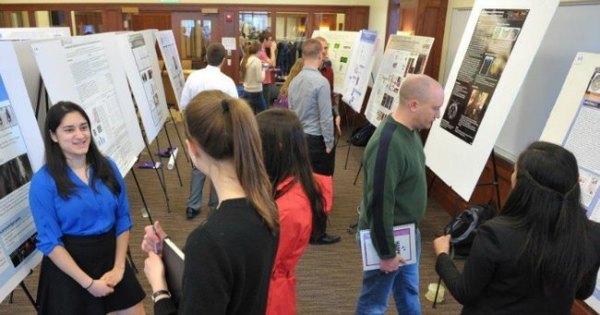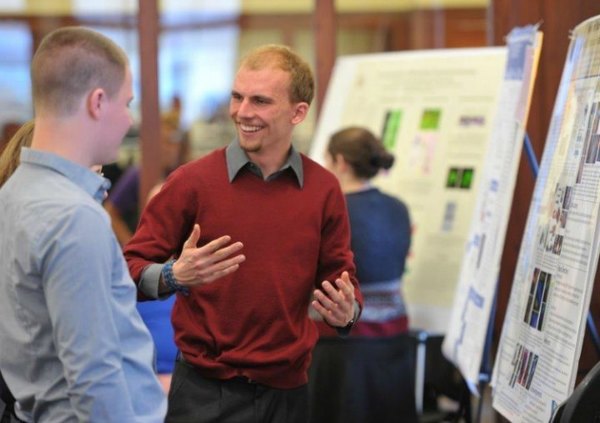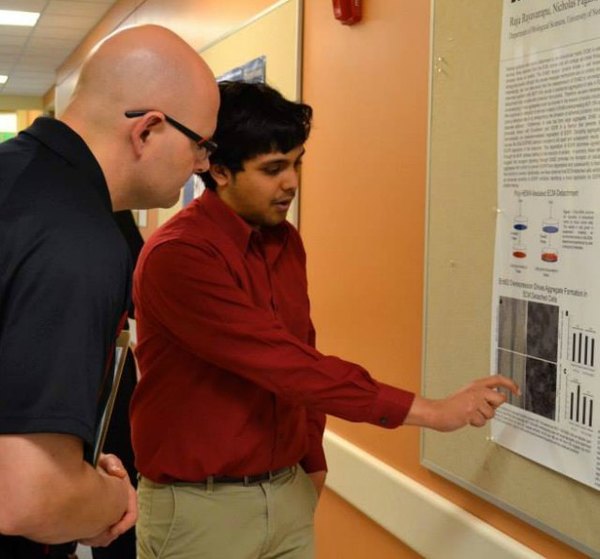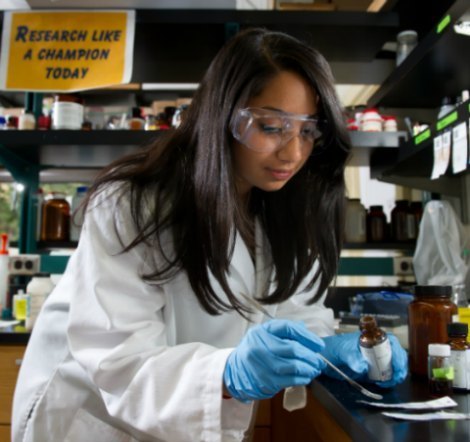On April 14, Harper Cancer Research Institute (HCRI) highlighted the groundbreaking achievements in cancer research at its third annual Research Day.
Nearly 200 people from the local community and Notre Dame family attended the day-long event, all to get a look at the achievements of student cancer researchers from Notre Dame and Indiana University School of Medicine-South Bend (IUSM-SB).

Central to the day was a poster competition. Judges asked the 80 competing undergraduates, medical students, graduate students, technicians, and post-doctoral fellows to explain the work presented on their posters, defend their results and speak to future applications of their research.
Dr. Laurie Littlepage, Campbell Family Assistant Professor of Cancer Research in Harper’s Department of Chemistry and Biochemistry, mentored several of students. “The Harper Cancer Research Institute has a fresh take on cancer research that I believe will translate into tangible clinical applications and will save lives.”
A good example of this, Dr. Littlepage says, is the research conducted by undergraduate student Maggie Kerper, who studied a rare, highly aggressive form of breast cancer that affects Kenyan women in their late teens and early 20s.
In her research, Kerper used breast tissue samples from 170 Kenyan patients. Some of the tissue was normal, some benign, and some was malignant. “We stained the malignant tissue for several breast cancer clinical markers to characterize it based on receptor status and immune function,” she said. Kerper will spend her summer working with the isolated DNA and RNA from the tissue samples, analyzing its sequencing.
“Curing cancer will continue to take a lot of hard work and persistence. (It will also require) the collaboration between many scientists, patients, clinicians, community-based organizers, industry and leaders,” Dr. Littlepage said.
Andy Bullock, PhD, Associate Director at Harper Cancer Research Institute said the poster competition had a two-fold benefit.
“We want the community to see how they can engage in the research being conducted at Harper,” Bullock says. “There’s a lot going on here. We are not very old—only three years—but the research coming from our labs truly has a global impact.”

The second benefit was a bit more practical. “We also want our students to get some experience presenting data, and learn about funding mechanisms,” Bullock says, knowing that funding is, of course, key to any further research. To that end, one benefactor surprised not one, but three presenters—including Kerper—with the ‘Research like a Champion’ scholarship award. Each of the students was given a $12,500 scholarship to further his or her research over the summer.
“As a student who has participated in Harper Research Day two years in a row, it’s been an extremely helpful way to become more comfortable with presenting my research and talking about my project with Notre Dame students and faculty—before going on to present at regional and national conferences,” Kerper said.

Read more on the ‘Research like a Champion’ scholarship winners here.
Harper Research Day also featured two speakers. Kate Voelker, Executive Director of RiverBend Cancer Services in South Bend, talked about cancer support in the community setting. “It’s important that all scientists who are involved with cancer research understand the importance of organizations like RiverBend and the role we play in the life of someone facing a cancer diagnosis,” Voelker said.
Dr. Christoph Reinhard, Senior Director of Translational Sciences Oncology at Eli Lilly and Company, was the keynote speaker for the day. He echoed Voelker with his lesson on the divide between researchers and scientists with the end-users: the patients and their oncologists. “We need to tailor our research in oncology to the patient,” Dr. Reinhard said. “This will speed up the time from research to treatment option.”
As Harper’s reputation continues to grow, organizers say attendance at Research Day has steadily grown as well.

“Not only did this event have greater interest from the local community, we also had scientists from Purdue and other research centers come to see the work we’re doing here,” said Angela Cavalieri, External Relations and Special Events Program Coordinator for Harper Cancer Research Institute.
“Over these past three years of the event, the level of sophistication from our students’ research has increased significantly. Our visitors are blown away by the research that’s being done here.”
Dr. Littlepage agrees. “Research Day certainly brought these groups together and energized me to continue fighting to end cancer. I’m excited to be a part of such a vibrant cancer research community.”
Winners of the Research Day 2014 poster competition
Eighty student cancer researchers presented their work at the third annual Harper Research Day poster competition. Each of the students’ work was judged based on the following criteria: visual components, content and presentation.
Here are the results:
Undergraduate Students:
First Place: Matthew Massana
Second Place: Matthew Metzinger
Third Place: Christopher Tricarico
Graduate students:
First Place: Ali Raja
Second Place: Yuliya Klymenko
Third Place: Lisa Cole
Postdoctoral Fellows:
First Place: Zdenek Slouka
Second Place: Dorothy Ahlf
Third Place: Michael Handlogten